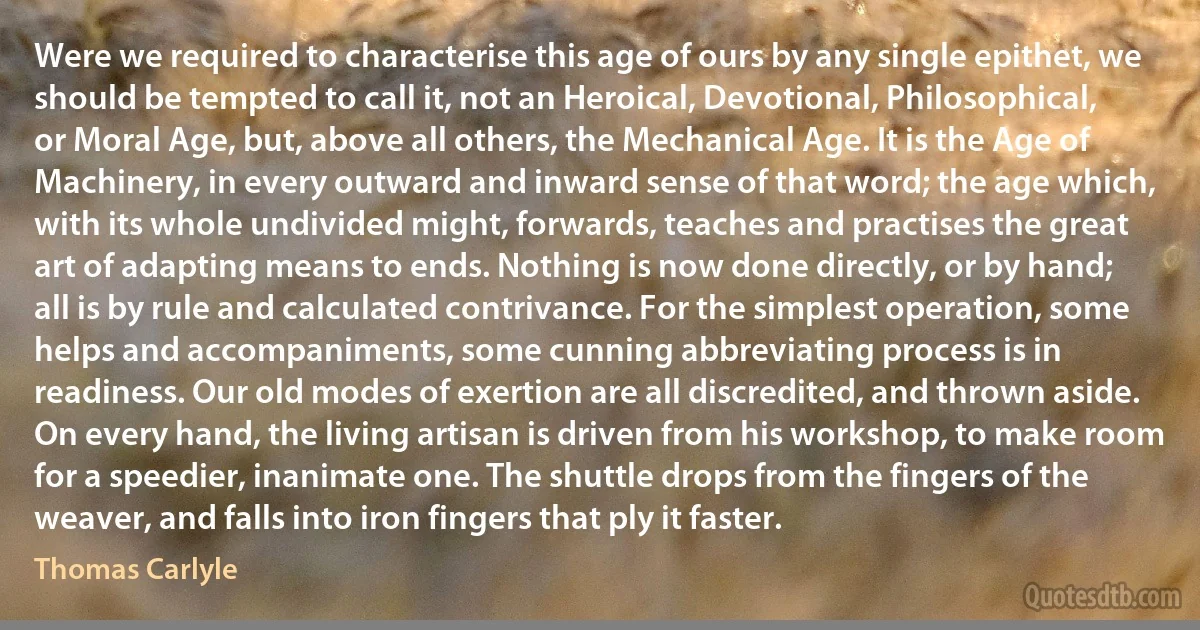
Were we required to characterise this age of ours by any single epithet, we should be tempted to call it, not an Heroical, Devotional, Philosophical, or Moral Age, but, above all others, the Mechanical Age. It is the Age of Machinery, in every outward and inward sense of that word; the age which, with its whole undivided might, forwards, teaches and practises the great art of adapting means to ends. Nothing is now done directly, or by hand; all is by rule and calculated contrivance. For the simplest operation, some helps and accompaniments, some cunning abbreviating process is in readiness. Our old modes of exertion are all discredited, and thrown aside. On every hand, the living artisan is driven from his workshop, to make room for a speedier, inanimate one. The shuttle drops from the fingers of the weaver, and falls into iron fingers that ply it faster.
Thomas CarlyleRelated topics
above age art aside call cunning devotional done drive epithet faster great hand inanimate iron living machinery might nothing now operation ply room rule sense should shuttle single throw weaver word means others falls endsRelated quotes
A severe morality holds that intercourse (and may hold this of eating, too) has something wrong about it if it is ever done except explicitly as being required for that preservation of human life which is what makes intercourse a good kind of action. But this involves thoroughly faulty moral psychology. God gave us our physical appetite, and its arousal without our calculation is part of the working of our sort of life. Given moderation and right circumstances, acts prompted by inclination can be taken in a general way to accomplish what makes them good in kind and there's no need for them to be individually necessary or useful for the end that makes them good kinds of action. Intercourse is a normal part of married life through the whole life of the partners in a marriage and is normally engaged in without any distinct purpose other than to have it, just as such a part of married life.

G. E. M. Anscombe
I gave up on this stuff. I gave up on my species and ... I gave up on my countrymen. Because I think we squandered great gifts. I think humans were given great great gifts: walking upright, binocular vision, opposable thumb, large brain ... We grew. We had great gifts, and we gave it all up for both money and God ... We gave it all up to superstition, primitive superstition, primitive shit ... Invisible man in the sky, looking down, keeping track of what we do, make sure we don't do the wrong thing, if we do, he puts us in hell, where we burn forever. That kind of shit is very limiting for this brain we have. So we keep ourselves limited. And then we want a toy and a gizmo and gold and we want shiny things, and we want something to plug in that will make big big big things for us... And all that shit is nothing! It's nothing.

George Carlin
[My] approach recognizes the basic principle of a written Constitution. We "the people" adopted a written Constitution precisely because it has a fixed meaning, a meaning that does not change. Otherwise we would have adopted the British approach of an unwritten, evolving constitution. Aside from amendment according to Article V, the Constitution's meaning cannot be updated, or changed, or altered by the Supreme Court, the Congress, or the President. Of course, even when strictly interpreted as I believe it should be, the Constitution remains a modern, "breathing" document as some like to call it, in the sense that the Court is constantly required to interpret how its provisions apply to the Constitutional questions of modern life. Nevertheless, strict interpretation must never surrender to the understandably attractive impulse towards creative but unwarranted alterations of first principles.

Clarence Thomas
Undue cultivation of the inward or Dynamical province leads to idle, visionary, impracticable courses, and, especially in rude eras, to Superstition and Fanaticism, with their long train of baleful and well-known evils. Undue cultivation of the outward, again, though less immediately prejudicial, and even for the time productive of many palpable benefits, must, in the long-run, by destroying Moral Force, which is the parent of all other Force, prove not less certainly, and perhaps still more hopelessly, pernicious. This, we take it, is the grand characteristic of our age. By our skill in Mechanism, it has come to pass, that in the management of external things we excel all other ages; while in whatever respects the pure moral nature, in true dignity of soul and character, we are perhaps inferior to most civilised ages.

Thomas Carlyle
But first a hush of peace, a soundless calm descends;
The struggle of distress and fierce impatience ends
Mute music sooths my breast - unuttered harmony
That I could never dream till earth was lost to me.
Then dawns the Invisible; the Unseen its truth reveals;
My outward sense is gone, my inward essence feels -
Its wings are almost free, its home, its harbour found;
Measuring the gulf, it stoops and dares the final bound -
O, dreadful is the check - intense the agony
When the ear begins to hear and the eye begins to see;
When the pulse begins to throb, the brain to think again,
The soul to feel the flesh and the flesh to feel the chain.
Yet I would lose no sting, would wish no torture less;
The more that anguish racks the earlier it will bless;
And robed in fires of Hell, or bright with heavenly shine
If it but herald Death, the vision is divine -.

Emily Brontë
